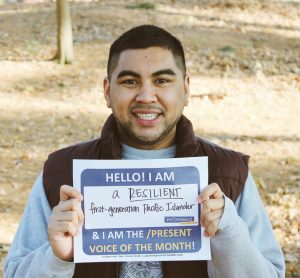Demeturie Gogue, University of Vermont
Where are you working right now?
During the academic year, I serve as a Graduate Research Assistant working alongside Dr. Vijay Kanagala, Assistant Professor at The University of Vermont. In this role, I have been exposed to the world of research as it pertains to the field of higher education and student affairs. Using asset-based frameworks, Dr. Kanagala and I hope to add to scholarship that illuminates the experiences of students of color in leadership positions as well as the various types of capitals that international students possess when navigating institutions of higher education. I have also had the privilege of serving as the managing editor for the policy brief, Perspectivas. Working with Dr. Kanagala has ignited a desire to continue my education and pursue a doctoral degree in the future.
What do you love about working there?
While I do not have the same amount of student interaction that I had as an undergraduate, serving as a Graduate Research Assistant has allowed me to become more familiar with the literature in the field and has grounded my practice in fundamental theories that have been used by scholars across the country and the world. Working with Dr. Kanagala has been an added bonus as well. Through him, I have been able to connect with other faculty and scholars from other institutions who are doing amazing work in their respective areas. As an aspiring qualitative researcher, I find joy in bringing in the personal experiences of the participants in a study and highlighting these narratives in research papers.
When you aren’t working, how do you spend your free time?
During my free time, I love playing volleyball. A group of us in our higher education and student affairs program came together to form a team for the academic year. Although we placed second in the Fall, we were able to win the championship in the Spring. If I am not playing volleyball, I like to watch movies and eat ice cream with friends. I am also open to new adventures, whether that be exploring a new area or trying new food spots.
What is your favorite grad school class and why?
My favorite class was Cultural Pluralism in Higher Education. It was both a rigorous and rewarding experience. We explored key topic such as multiculturalism, diversity, power, privilege, and oppression. In addition, this course required us to challenge our notion of social justice and what we “thought” we knew about the concept. This course made people (including myself) feel uncomfortable at times, but I think that is part of the process of growing in our own awareness and understanding of our identities. This course reminded me that there is no diversity or social justice “expert.” Instead, it is a continuous process of reflection, healing, and growth.
Who inspired you to get involved in Higher Education?
I decided to go into higher education because of my involvement in multicultural affairs and orientation. During my third year of undergrad, I worked closely with a woman who is now my mentor and student affairs colleague, Marissa Reynoso, to coordinate a four-day, three-night yield event for students of color. It was through her love, mentorship, and support that I decided to go into the field of higher education and student affairs. Moreover, working with student-run, student-initiated organizations who were doing the work that the University should have been doing reminded me why it was important for me, a first-generation Pacific Islander, to be in these spaces to create change for my community. Seeing the love and passion that Marissa poured into her students made me want to do the same for those who I will be working with in the future.
What is the most valuable lesson you have learned in your career (so far)?
When I think about valuable lessons, the first thing that came to mind was a question that a higher education and student affairs professional posed to me. They asked, “What are you willing to get fired for?” This question continues to linger with me as I engage with students and advocate for my community in various spaces. For me, this was an important question that I had never really grappled with. In the field, you may find yourself at an institution that holds a different set of views than your own or be supervised by someone whose passions may not align with yours. Regardless, it is important to know your capacity, and that is something that I am learning more about as I continue to navigate this field.
What is on your Higher Ed bucket list?
One thing that I want to check off my higher education bucket list is the opportunity to publish with a professor who I have had the opportunity to learn from. Whether that be my current supervisor or a faculty who I have the honor of taking a class with in the future, my hope is that I can one day see my last name written next to their last name in a reference section.
What advice would you offer to undergraduate seniors who are starting to search for grad programs?
For undergraduate seniors who are starting to search for graduate programs, my only advice to you is to network and reach out to current students in the program. Ask about their experience in their program and in the region. Inquire about future aspirations after the program and how the curriculum has assisted them in that career development. During my graduate program search, I found people through mutual friends who could tell me about what they loved about their program as well as be honest about what they felt could be improved. It is important to recognize, however, that these experiences may look different for others; keep that in mind when asking others about their program.

